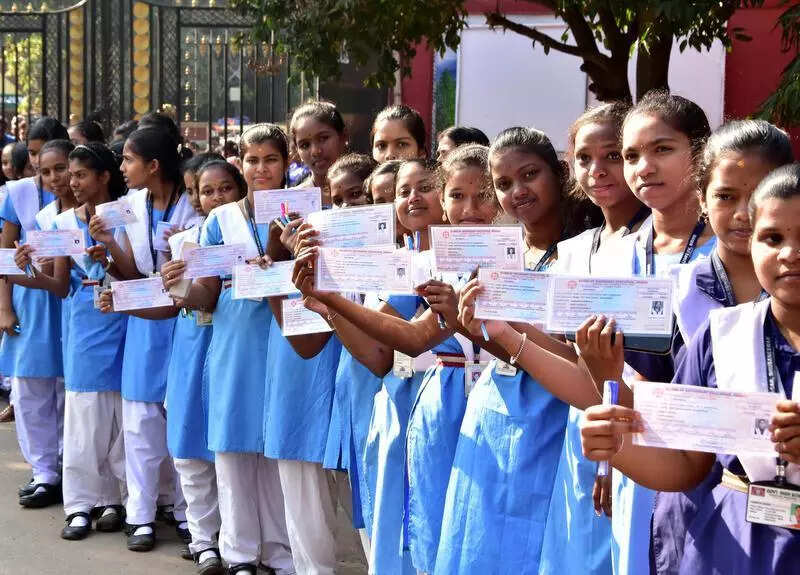In season of boards, schools help students manage stress | Bhubaneswar News

Bhubaneswar: With board exams around the corner, students are immersed in last-minute preparations, including doubt-clearing sessions and revisions. However, the pressure to perform well is leading to stress and anxiety in many students, resulting in headache, dizziness, nausea and sleeplessness, among other problems.
Educationists, psychiatrists and teachers have urged students to stay focused, manage stress effectively and maintain a healthy routine. They also emphasised the role of parents in providing emotional support to their wards.
Psychiatrist Suvendu Narayan Mishra suggested that students should view exams as a part of their academic journey rather than the ultimate test of their capabilities. “Overthinking and excessive stress can negatively impact performance. Instead, students should identify their weak areas, focus on strategic preparation, and take frequent short breaks to avoid burnout,” said Mishra, president of Odisha Psychiatrist Society. He recommended the Pomodoro technique — a study method that involves 25-minute focused sessions followed by a short break of five minutes — to help students maintain concentration. Additionally, he advised students to get enough sleep and consume nutritious food to stay mentally and physically fit.
To help students overcome exam-related stress, several schools in the city have introduced support measures, including online counselling, surprise home visits, yoga sessions, easy memorisation techniques, and tips to answer questions. Schools have also conducted mock exams to familiarise students with the exam pattern. “We gave equal emphasis on time management, stress management and health management. We have asked students to attempt MCQs first and then go for long questions. Eat healthy, sleep well, and stay away from social media are some of the important tips to follow during board exams,” said S K Mohapatra, teacher in a city school. “Good health is as important as good preparation. A well-rested mind retains information better, and a balanced diet can boost cognitive function,” said Rajiv Sahu, a senior schoolteacher.
Experts highlighted that parents should act as a pillar of support rather than a source of stress. “Children look up to their parents for reassurance. Harsh words or unrealistic expectations can shake their confidence, no matter how well-prepared they are,” said Mishra.
Instead of pressuring children, they said parents should create a positive environment at home. “A calm and encouraging approach will help students perform better. Parents should remind their children that exams are just a phase of life, not a measure of their worth,” said Pravati Subudhhi, another teacher.
Educationists, psychiatrists and teachers have urged students to stay focused, manage stress effectively and maintain a healthy routine. They also emphasised the role of parents in providing emotional support to their wards.
Psychiatrist Suvendu Narayan Mishra suggested that students should view exams as a part of their academic journey rather than the ultimate test of their capabilities. “Overthinking and excessive stress can negatively impact performance. Instead, students should identify their weak areas, focus on strategic preparation, and take frequent short breaks to avoid burnout,” said Mishra, president of Odisha Psychiatrist Society. He recommended the Pomodoro technique — a study method that involves 25-minute focused sessions followed by a short break of five minutes — to help students maintain concentration. Additionally, he advised students to get enough sleep and consume nutritious food to stay mentally and physically fit.
To help students overcome exam-related stress, several schools in the city have introduced support measures, including online counselling, surprise home visits, yoga sessions, easy memorisation techniques, and tips to answer questions. Schools have also conducted mock exams to familiarise students with the exam pattern. “We gave equal emphasis on time management, stress management and health management. We have asked students to attempt MCQs first and then go for long questions. Eat healthy, sleep well, and stay away from social media are some of the important tips to follow during board exams,” said S K Mohapatra, teacher in a city school. “Good health is as important as good preparation. A well-rested mind retains information better, and a balanced diet can boost cognitive function,” said Rajiv Sahu, a senior schoolteacher.
Experts highlighted that parents should act as a pillar of support rather than a source of stress. “Children look up to their parents for reassurance. Harsh words or unrealistic expectations can shake their confidence, no matter how well-prepared they are,” said Mishra.
Instead of pressuring children, they said parents should create a positive environment at home. “A calm and encouraging approach will help students perform better. Parents should remind their children that exams are just a phase of life, not a measure of their worth,” said Pravati Subudhhi, another teacher.
















